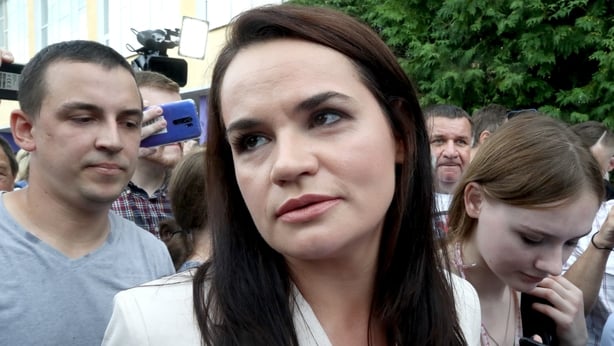The Belarus President, Alexander Lukashenko, has stripped the credentials of two former diplomats who supported opposition protests and fired his "inadequate" ambassador to Latvia, state-run news agency Belta has reported.
Mr Lukashenko claimed a sixth term in disputed presidential elections last month that sparked historic demonstrations against his decades-long rule and a brutal police crackdown.
Pavel Latushko, a former envoy to France who had his status revoked in a presidential decree signed Wednesday according to Belta, emerged as a key opposition figure in the post-election protests.
The second diplomat, Minsk's former ambassador to Slovakia Igor Leshchenya, spoke out in support of the demonstrators last month, saying he was "shocked by stories of torture and beatings," before resigning.
The presidential orders said the two men lost their diplomatic rank "due to actions discrediting the state (diplomatic) service," Belta reported.
The ex-Soviet country's authoritarian leader also fired the Belarusian ambassador to Latvia Vasily Markovich for "inadequate performance" of his official duties.
The Baltic states of Estonia, Latvia and Lithuania have blacklisted Mr Lukashenko and 29 other high-ranking officials from the Belarusian election commission, ministries and police.
Read more:
EU says Belarus vote not free, threatens sanctions
Clashes in Belarus after exit poll shows Lukashenko in landslide victory
However, Poland proposed a European Union stabilisation fund for Belarus worth at least €1bn as unprecedented protests rock the country over its disputed presidential election.
Warsaw's call for financial support comes days after Russian President Vladimir Putin backed embattled Belarusian president Alexander Lukashenko and promised a €1.3bn loan.
A "new Marshall Plan" from the EU "should really be significant... so at least a billion euros at this stage," Polish Prime Minister Mateusz Morawiecki said at a joint press conference with his Lithuanian counterpart in Vilnius.
The Marshall Plan saw the US pump vast financial aid into western Europe to help it rebuild after World War II.
Mr Morawiecki said he would formally present the plan at the 24-25 September European Council, adding that fellow EU eastern members the Czech Republic, Hungary, Slovakia and Lithuania - which like Belarus and Poland once lay behind the Iron Curtain – have endorsed it.
The Polish leader floated the idea of the International Monetary Fund also buttressing Belarus.
Belarus's leading opposition figure Svetlana Tikhanovskaya claimed victory in the 9 August vote, accusing the government of rigging it to hand Mr Lukashenko a landslide victory.

Since the election, the former Soviet republic has seen mass protests calling for an end to the 26-year rule of the man sometimes called "Europe's last dictator".
A former collective farm manager, Mr Lukashenko governs Belarus with an iron fist and has overseen a violent crackdown against the protests.
Ms Tikhanovskaya warned last week that Belarus was on the "threshold of an economic abyss" as private Belarusian companies, notably in its vibrant tech sector, have begun to seek out opportunities in neighbouring EU states.
Mr Putin has been keen to unify Russia and Belarus, and Moscow has accompanied its offers of military and economic aid with calls for tighter integration.
Mr Lukashenko vowed to strengthen ties with Russia at an in-person meeting with Mr Putin in Black Sea resort Sochi last week.

